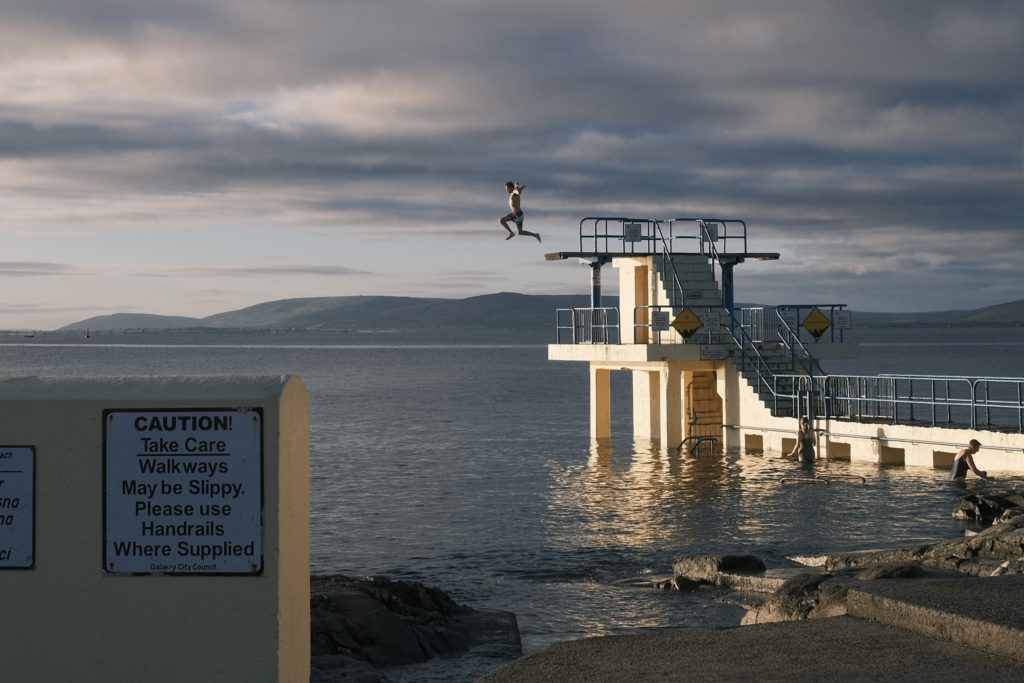By Ali Watkins

It was around 8 a.m. the first time I stepped off the ledge at Blackrock. I had anticipated the adventure for days, and it took me seconds to regret it entirely. The water slammed into my chest like a slab of concrete, so much colder and darker, so much angrier than I had imagined. Frigid and shivering, my chest spasmed. I couldn’t touch the bottom. I couldn’t breathe. I couldn’t feel my feet. “This,” I thought, in a deep, guttural surrender, “was a terrible mistake.”
—
I gave up open water swimming more than ten years ago. It was after my last triathlon, a now-defunct Ironman in the Poconos. I had dove into the lake water and when I opened my eyes and saw darkness, I panicked. My body would not cooperate — I inhaled each time I put my head into the water, a reflex more overwhelming than any I’d felt before. The strange phobia had swept over me out of nowhere, some long-lost ghost I hadn’t known was buried. I didn’t understand, but there it was. I finished that race in a backstroke, perplexed and angry that I had lost the war to water. I haven’t swam laps in dark, open water, since.
And then, Galway.
As soon as I heard of the sea swimmers, a light flickered in my brain. I suppose a part of me understood then that I’d join them. It’s my more annoying habit, to do things that are cold, hard and horribly early, for no reason other than some strange mix of adrenaline junkiism and self-loathing.
For weeks, I watched them. I ran the promenade each morning, stopping at Alain, the Blackrock coffee hut, and studied the morning rhythms. I watched how people swam (very strong), when people swam (very early) and what people wore (very little). Like finding the wizard behind the curtain, I felt safer, seeing the mechanics.
I gave in in early October, bought a wetsuit (a clear indicator that I’m not from here; I’ve accepted this) and took the first of many morning walks down the prom, which led me to the tower’s ledge, which led me to the water, which led my life to flash before my eyes. The closest I have come, to being that cold, was February in rural Wyoming. I was dry, then.
Bull-headed, I dunked my head underwater and opened my eyes. The ghost from the Poconos stirred — I felt my body flutter, and I instinctively inhaled. The same phobia, ten years old, was still there.
Frantically treading water, I was turning for the ladder when a man in a speedo caught my eye.
“Better get moving,” he said. “It’ll get warmer.”
His words calmed me. If I left, I wouldn’t come back. So I started slowly, one stroke, one meter at a time. Each time my head went underwater, I reflexively panicked. Each time, I stopped and collected myself. One more breath. One more stroke. I put my head under again, this time with my eyes closed. My breath stayed steady. One stroke, then the next. Breathe. Stroke. Breathe. Stroke stroke stroke. When you close your eyes underwater, I realized, you can be anywhere.
I turned the tide that morning, swimming a strong lap to the 100-meter buoy, then back again. I laughed as I floated, looking back at the shore.
My mornings now begin at Blackrock. Faces are more familiar. The kind kids at the coffee shop know me. “How was the water today?” they ask. I always say it’s cold, and they always tell me to “just keep coming.” I’ve listened.
I’m stronger than I remembered. My second day, I swam 600 meters in rough water, three times out and back to my North Star, the yellow buoy. I prefer the rougher water, the mornings when I get to fight the tide, back in some primal state of survival and strokes. Each day is easier. Each day there are fewer shadows. Each day I open my eyes a few seconds longer than the last time. Each day is a little colder, and each day I care a little less.
It’s my joke now, the line that makes me friends at the tower. “It only gets warmer, right?” We laugh, and laugh. I know, I say, pointing at my wetsuit. Such an American.
Bah, they say. No bother.
“Fair play to ye,” they say, “being out here.”
